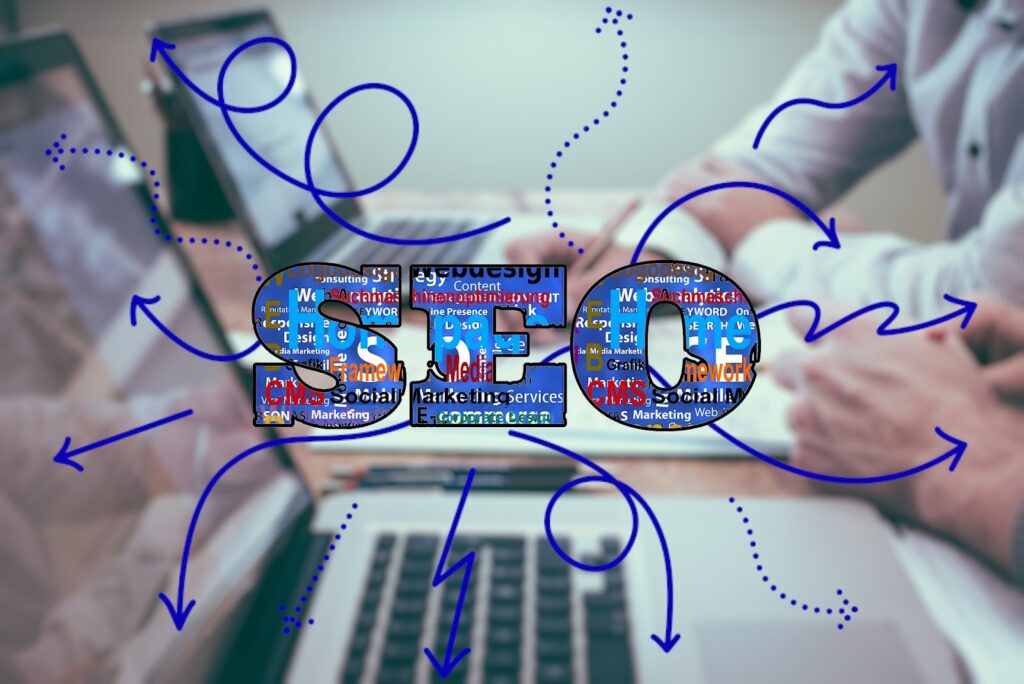Key Takeaways
- Organic search now drives roughly 60%+ of B2B website traffic and can generate up to 14x more leads than outbound alone, making SEO a core pipeline channel, not just a marketing vanity metric.
- The best SEO B2B marketing strategies start with sales: build keyword and content roadmaps directly from SDR/AE conversations, objections, and closed-won deals so every page is tied to revenue.
- Around three-quarters of B2B buyers complete most of their research before talking to sales, which means your SEO content is effectively your first sales rep in 2024.
- You can boost organic performance fast with practical moves like tightening on-page intent, improving internal linking, and adding strong 'book a demo' style CTAs to your highest-traffic SEO pages.
- SEO, content, and SDR outbound work best as a single system: search brings in research-stage demand, while an SDR team like SalesHive converts that intent into qualified meetings and pipeline.
- Modern B2B SEO isn't just about Google anymore, structuring content for AI assistants and generative answers (clear headings, FAQs, concise answers) is becoming just as important for discovery.
- Bottom line: treat SEO as a revenue channel with shared sales/marketing KPIs, and use a partner like SalesHive to close the loop from organic visit to booked meeting.
Treat SEO Like a Sales Channel (Not a Marketing Side Project)
If you lead B2B growth in 2024, SEO isn’t optional—it’s the front door to your pipeline. B2B websites get about 62% of their traffic from organic search, and SEO can generate up to 14x more leads than outbound alone. When most of your ideal buyers start in Google, being “kind of” visible is the same as being invisible.
The bigger shift is behavioral: buyers self-educate before they’ll take an SDR call. Research shows 74% of B2B buyers do more than half of their research before contacting sales, which means your content is doing early discovery without a rep in the room. That’s why SEO B2B marketing strategies have to be built for revenue, not just rankings.
In our work at SalesHive, the companies that win don’t separate “SEO” from “sales development.” They connect keyword strategy to real objections, build pages that convert into meetings, and then use an SDR engine to follow up fast when intent spikes. This article breaks down exactly how to build that system.
Why Search Behavior Now Shapes Your SDR Pipeline
Most B2B journeys start with a generic search, not a vendor shortlist. Around 71% of buyers begin with problem-first queries, which is why you need to rank for pains, outcomes, and use cases—not only your product name. If you’re absent at that moment, competitors get to frame the category and set evaluation criteria.
Organic is also a revenue driver, not just a traffic driver. Data shows organic search generates about 53% of inbound leads and roughly 45% of revenue for B2B marketers, outperforming any single channel in many mixes. That’s why sales leaders should care: when organic is strong, outbound feels warmer and conversion math improves.
Quality matters as much as volume, and organic tends to deliver buyers who are actively comparing options. The average B2B organic conversion rate is about 5.0%, which can materially lift SQL flow when your top pages are built to capture demand. The practical implication is simple: SEO decisions directly influence how many qualified conversations your SDRs can create each month.
Build Keyword Strategy From Real Sales Conversations
The best SEO B2B marketing strategies start with the same place great outreach starts: what prospects actually say. Treat SEO pages like SDR scripts by turning recurring questions and objections into pages that answer them in plain language. When your content mirrors discovery calls, it doesn’t just rank—it pre-handles objections and shortens sales cycles.
In B2B, you also have to map keywords to the buying committee, not just a single persona. Finance searches ROI and risk, IT searches integrations and security, and end users search “how do I do X” workflows. If you only build content for one role, you’re invisible to the stakeholders who can stall the deal later.
A fast way to operationalize this is a joint workshop: pull SDRs, AEs, and marketing into one session and build clusters directly from closed-won notes and call recordings. Prioritize topics by revenue impact even when search volume looks modest, because high-intent “boring” keywords often map to enterprise ACV. This approach keeps SEO tied to pipeline instead of becoming a disconnected content calendar.
Turn High-Intent SEO Pages Into Meeting Engines
Ranking is only half the job—conversion is where pipeline is made. We recommend auditing your top organic landing pages for sales readiness: is the intent obvious, does the page answer the “should I trust you” questions, and is the next step crystal clear? If the CTA is buried or generic, you can drive thousands of visits and still starve your SDR team.
Treat your best SEO pages like landing pages, even if they’re educational. Add direct “book a demo” style CTAs, offer sales-friendly hooks like an ROI review, and remove friction so a prospect can convert in one or two clicks. When your pages align to intent and have strong offers, that 5.0% organic conversion benchmark becomes achievable instead of aspirational.
This is also where SEO and outbound should meet. If someone hits a comparison or pricing page, that’s a buying signal your SDR team can work immediately—especially if you route that activity into sequences and call tasks. Done right, SEO becomes the signal layer that tells your outbound sales agency motion where to focus first.
If your SEO content can’t answer the objections your SDRs hear every day, it won’t create trust—and trust is what turns search traffic into meetings.
Create Content Assets SDRs Can Use in Cold Outreach
Don’t publish content that only lives in Google—package it so your team can use it in conversations. The fastest lift we see comes when companies turn their best guides, implementation explainers, and comparison pages into “sendable” assets for SDR follow-up. That’s how content becomes a reply driver for a cold email agency motion and a credibility tool for cold calling services.
You don’t need dozens of new posts to do this; you need the right formats tied to buying decisions. Prospects look for de-risking content (security, rollout, internal change management), justification content (ROI, cost of doing nothing), and evaluation content (alternatives, comparisons). When your SDR agency has these assets ready, outreach feels helpful instead of pushy.
Here’s a simple way to connect SEO content to sales execution without building a complicated enablement program.
| SEO Asset Type | Best Use in SDR Outreach |
|---|---|
| Problem-first guide | Use as a first-touch value add to align with generic searches and educate quickly |
| Comparison / alternatives page | Send after a reply to help prospects self-qualify and move into evaluation |
| Pricing / ROI explainer | Use when finance is involved to answer cost questions and reduce late-stage friction |
| Implementation plan / security overview | Use to multi-thread with IT and unblock risk concerns early |
Avoid the Mistakes That Kill SEO-Sourced Pipeline
The most common failure mode is chasing traffic instead of pipeline. Broad keywords may inflate sessions, but they rarely turn into discovery calls—so your “wins” show up in dashboards while your CRM stays flat. The fix is prioritizing problems, solutions, and use cases your best customers actually buy for, then measuring meetings, SQLs, and revenue sourced from organic.
Another costly mistake is letting SEO live only in marketing. When sales isn’t involved, you publish content that doesn’t match what prospects say on calls, and that disconnect creates friction when the SDR finally engages. The best teams review organic landing pages in the same pipeline meeting as outbound performance so SEO is held to the same revenue KPIs.
Finally, thin product-centric content and weak on-page conversion quietly drain results. Buyers start with generic searches, so educational depth wins early—and clear CTAs win late. If your highest-traffic pages don’t have a direct path to a conversation, you’re paying the opportunity cost every day.
Connect SEO Demand to SDR Execution with SalesHive
SEO is powerful, but it doesn’t replace sales development in complex B2B deals. Even if SEO produces 14x more leads than outbound in some datasets, you still need humans to qualify accounts, multi-thread stakeholders, and follow up with discipline. The win is building one system where organic demand creates intent signals and an outbound sales agency motion converts those signals into meetings.
This is exactly where we fit at SalesHive. Founded in 2016, we’ve booked over 100,000 B2B meetings for more than 1,500 clients by combining expert SDR teams with an AI-powered outbound platform. Teams use us as a scalable option for sales outsourcing when they want the consistency of an outsourced sales team without the overhead of hiring, training, and managing an internal cold calling team.
Operationally, the workflow is straightforward: your SEO program attracts and educates, and our SDRs run tight follow-up across cold email, calls, and persistence—backed by list building services and personalization. Because content marketing can generate about 3x as many leads while costing 62% less than traditional approaches, speed-to-lead and quality follow-up become the differentiators. When the handoff is clean, SEO stops being “marketing” and becomes predictable opportunity creation.
Prepare for AI Search and the Next Version of B2B Discovery
Modern B2B SEO isn’t only about blue links anymore—buyers increasingly discover vendors through AI assistants and generative answers. To show up there, structure pages for clarity: define terms fast, use tight headings, and answer “what, why, how” in language a buying committee would recognize. This doesn’t change the fundamentals; it raises the bar for how cleanly you communicate.
You also need a measurement model that matches how revenue is created. Track organic-sourced MQLs, SQLs, opportunities, and closed-won, then break performance down by landing page so you know what topics actually create pipeline. It’s telling that 23% of B2B marketers cite organic search as their most effective revenue-driving channel, but the companies that win are the ones that prove it in the CRM.
Your next steps are practical: audit your top organic pages for sales readiness, run a sales-and-marketing keyword workshop, and build a small “SEO content for SDRs” library your team actually uses. If you want to accelerate without building everything in-house, outsourcing execution—whether that’s list building, outreach, or full SDR coverage—can close the loop from organic visit to booked meeting. When SEO and sales development work together, you don’t just get traffic; you get pipeline.
Sources
📊 Key Statistics
Expert Insights
Treat SEO Pages Like SDR Scripts
When you're planning SEO content, start from the questions SDRs get hammered with on cold calls and discovery. Build pages that answer those objections in the same plain language. That way, your content not only ranks, it also warms prospects up before your reps ever pick up the phone.
Map Keywords to the Buying Committee, Not Just the Persona
In B2B, multiple stakeholders Google different things: finance searches for ROI, IT searches for integrations, end users search for how-to use cases. Build separate keyword clusters and pages for each role so your brand shows up for every critical member of the buying group.
Design SEO Content to Be Used in Outbound Sequences
Don't create SEO content that only lives in Google. Package your best articles, comparison pages, and checklists so SDRs can drop them into cold email and LinkedIn touches. This is how you turn 'content' into real conversation starters and lift reply and meeting rates.
Prioritize Topics by Revenue, Not Just Search Volume
High-intent, low-volume keywords often map to enterprise deals. Use CRM data to identify which topics and use cases show up in closed-won notes, then prioritize those even if the search volume looks modest. A few extra high-ACV deals will beat thousands of unqualified visitors.
Optimize for AI Assistants and Generative Answers
As more buyers use AI search and chatbots, structure content with clear headings, concise definitions, and FAQ sections. That formatting makes it easier for generative engines to pull your company into summarized answers, which becomes a new top-of-funnel discovery channel.
Common Mistakes to Avoid
Chasing traffic instead of pipeline
Ranking for broad, low-intent keywords looks great in a dashboard but rarely turns into discovery calls or opportunities. Your SDRs end up with a list of visitors that will never buy.
Instead: Prioritize keywords tied to problems, solutions, and use cases your best customers actually care about. Measure success in meetings, SQLs, and revenue sourced from organic, not just sessions.
Letting SEO live only in marketing
When SEO strategy is built without sales input, you get content that doesn't match what prospects say on the phone, leading to disconnect and lower trust when reps finally engage.
Instead: Involve SDR and AE leaders in keyword research and content planning. Review top search pages in pipeline review so both teams can see which topics are actually generating revenue.
Publishing thin, product-centric content
Buyers start with generic problem searches, not your brand name or feature list. Product-only pages rarely rank for those early-stage queries and don't build thought leadership.
Instead: Create deep, educational content around pains, jobs-to-be-done, comparisons, and implementation. Use your product pages to convert, and your content to attract and educate.
Ignoring on-page conversion on high-traffic SEO pages
You can drive thousands of visitors and still starve your SDR team if pages bury CTAs or send people to generic contact forms that no one completes.
Instead: Turn SEO pages into landing pages: add prominent 'Book a demo' or 'Talk to sales' CTAs, embed calendar widgets, and include social proof so visitors can convert in one or two clicks.
Treating SEO as separate from outbound sequences
When SDRs don't know what's ranking or what content exists, they default to generic messaging and miss chances to anchor outreach to topics prospects already searched.
Instead: Give SDRs a simple catalog of top SEO pages and assets with talk tracks for each. Build outbound cadences that reference and link to those pages to reinforce your story across channels.
Action Items
Audit your top 20 organic landing pages for sales readiness
Pull the highest-traffic pages from analytics and check: Is the intent clear? Are there strong CTAs to book a meeting? Do they address real sales objections? Fix gaps before chasing more traffic.
Run a joint keyword and content workshop with sales and marketing
Bring SDRs, AEs, and marketers into a 60-minute session to list top questions, objections, and competitor comparisons. Turn that list directly into SEO keyword clusters and page ideas.
Add sales-friendly offers to SEO pages
Beyond 'Contact us', test offers like personalized ROI reviews, live demos, or short advisory calls. These convert higher-intent visitors who are closer to buying and give SDRs a clearer hook.
Create a one-page 'SEO Content for SDRs' cheat sheet
Document 10-15 of your best SEO assets with short summaries, ideal use cases, and suggested email snippets. Train SDRs to use these links as follow-ups and value adds in cold outreach.
Track pipeline metrics specifically from organic search
In your CRM, set up a 'Lead Source = Organic Search' view and monitor SQLs, opportunities, and closed-won. Review it in the same meeting as outbound performance so SEO is held to real revenue KPIs.
Decide what to insource vs. outsource with a partner like SalesHive
Keep strategic positioning and subject-matter expertise in-house, but consider outsourcing SDR execution, list building, and even search-driven campaign follow-up to a specialized team.
Partner with SalesHive
SalesHive offers US‑based and Philippines‑based SDR teams that handle the grind: cold calling, cold email outreach, and persistent follow‑up with decision‑makers at your target accounts. They also take on list building and contact research, then use their eMod AI personalization engine to craft emails that stand out in crowded inboxes. Because their contracts are month‑to‑month with risk‑free onboarding, you can layer SalesHive on top of your SEO programs without a huge fixed bet-using their team to systematically convert organic interest into qualified meetings and real pipeline.
❓ Frequently Asked Questions
Why should a sales leader care about SEO B2B marketing strategies?
Because your buyers are Googling you long before they talk to your reps. In most studies, B2B buyers complete the majority of their research before contacting sales, and more than half of inbound leads and a large share of revenue now originate from organic search. When SEO is strong, SDRs work warmer, higher-intent leads and outbound performance goes up; when it's weak, they're starting from a cold, uphill battle.
How is B2B SEO different from B2C SEO?
B2B SEO focuses on longer, more complex buying journeys with multiple stakeholders, lower keyword volumes, and higher deal values. You're less worried about ranking for massive consumer phrases and more concerned with owning high-intent, niche queries like 'manufacturing ERP integration with Salesforce'. Content needs to address pains, ROI, security, and implementation details that matter to buying committees, and then funnel into demos and discovery calls rather than e-commerce checkouts.
What SEO metrics actually matter for my SDR and AE teams?
Traffic and rankings are directional, but the metrics that matter to sales are organic-sourced MQLs, SQLs, opportunities, and closed-won revenue. At an earlier stage, you should also watch organic landing page conversion rates, meeting-booked rates from organic leads, and opportunity creation by landing page. These tell you whether the visitors SEO brings in are people your team can actually close.
How long does it take for SEO to impact B2B pipeline?
For most B2B companies, you'll see leading indicators (more qualified organic traffic, better rankings, more form fills) within 3-6 months if you're executing well. Meaningful pipeline impact usually lands in the 6-12 month window, since organic visitors still have to progress through evaluation cycles. That's why aligning SEO with SDR follow-up and outbound sequences is so important: it helps you monetize that traffic faster.
Can SEO replace outbound sales development?
Not in B2B. Even though SEO can generate far more leads per dollar than pure outbound, you still need humans to qualify complex accounts, navigate buying committees, and run multi-threaded outreach. The real win is using SEO to identify and attract high-intent accounts, then putting an SDR team like SalesHive on top to turn that intent into conversations and meetings at scale.
What types of content should we create to support both SEO and outbound?
Start with problem-focused guides, in-depth solution pages, comparison pages (you vs. status quo or competitors), implementation and ROI explainers, and case studies tied to specific niches. These assets rank well for research queries and give SDRs powerful follow-up material for cold emails and calls. The goal is to build content that educates, de-risks decisions, and answers real questions your reps hear every week.
How does AI search and generative answers change B2B SEO?
AI assistants and generative search are pushing marketers to structure content for quick, clear answers: concise definitions, bullet points, FAQs, and schema that make it easy for models to pull your brand into summaries. Instead of just long essays, you need skimmable sections that directly answer 'what', 'why', and 'how' questions. It's still SEO, but the bar for clarity and structure is higher, and your content is increasingly competing to be cited by both Google and AI tools.






